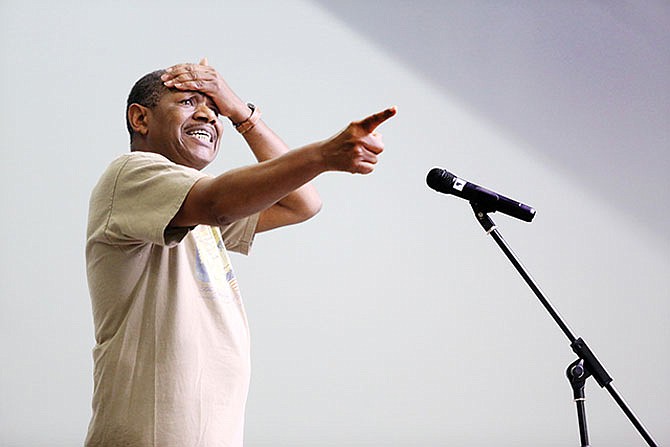It's hard to find humor in the Civil War and the life of Abraham Lincoln - history marred by sadness and death.
But three-time Emmy-award-winning storyteller Bobby Norfolk did his best during a virtual performance Wednesday. The St. Louis-based storyteller is famed for his engaging presentations, which mingle education with comedy. During the event, hosted by Daniel Boone Regional Library, Norfolk gave a rapid-fire overview of Lincoln's life, influences and legacy.
"Let's stand in the shadow of Lincoln," Norfolk began.
Born in 1809 to Thomas and Nancy Lincoln, Abraham Lincoln grew up poor but learned how to read as a child. Norfolk imagined a young Abe reading the biblical book of Genesis by the light of a lantern, being careful not to set the precious pages on fire.
"God stepped out to space and said, 'I'm lonely. I think I'll make me a world,'" Norfolk summarized.
Lincoln also enjoyed Aesop's Fables.
"From that turtle, (Lincoln) learned that persistence pays off," Norfolk said.
Later in life, Lincoln's influences expanded to include third U.S. President Thomas Jefferson, a man who once wrote that holding slaves was like having "the wolf by the ear," and abolitionists such as Harriet Beecher Stowe, Frederick Douglass, Harriet Tubman and Henry "Box" Brown. He read their writings while studying the law and working as a clerk.
Brown became famous for engineering his own escape from slavery and later penned an autobiography about his life. Brown's enslaver sold Brown's wife and three children.
"He said, 'This ain't right, I gotta find my way to buy my family back,'" Norfolk recounted.
Brown worked braiding tobacco, and one day, he steeled his courage and poured acid over his finger. The injury was his excuse to visit a doctor rumored to be part of the Underground Railroad. Dr. Samuel Smith and Brown worked out a plan: They drilled holes into a wooden crate, just 3-feet-by-3 feet-by-2-feet, and nailed Brown up inside with a few hardtack biscuits and some water. Then, Brown spent 27 hours in cramped silence while being shipped to an anti-slavery group in Philadelphia.
"At one point, two men sat on the box and ate lunch," Norfolk said.
Brown moved to England after the passage of the Fugitive Slave Law of 1850 and never reunited with his family, though he ultimately remarried and became a magician.
"Henry Brown's memoir settled into Lincoln's system and fueled his drive to end slavery," Norfolk said.
Lincoln became 16th president while the South's secessionist movement grew in power. In 1859, abolitionist John Brown led a raid on Harper's Ferry, Virginia, in an attempt to spark an uprising by enslaved people. The attempt failed, and Brown was defeated by a company of U.S. Marines overseen by Col. Robert E. Lee. Labeled a traitor, Brown was sentenced to be hanged. He slipped a note to an onlooker on his way to the gallows.
"To paraphrase it, he wrote, 'The guiltiness of this nation shall not be absolved except through blood,'" Norfolk said.
Two years later, the First Battle of Fort Sumter kicked off the Civil War in earnest.
"Lee joins the confederacy under Jefferson Davis, the antithesis of Abraham Lincoln," Norfolk said.
It was a terrible time.
"They say the battle of Gettysburg was so horrendous, after that battle, men could walk across dead bodies for several miles and never touch the ground," Norfolk said.
Meanwhile, Lincoln's home life was struggling - two of his four sons had died, and his wife, Mary Todd Lincoln, was inconsolable.
Ultimately, Gen. Ulysses S. Grant's strategy of destroying supply lines and Maj. Gen. William Tecumseh Sherman's brutal march through Georgia helped force the Confederacy' toward surrender.
"When the dust cleared 620,000 Americans lay dead to end that terrorism called slavery," Norfolk said. "But things were not settled - some other people had to pay the ultimate price of the Confederacy losing that war."
On April 14, 1865, Lincoln went to a performance at Ford's Theatre and was fatally shot by actor John Wilkes Booth. Booth's co-conspirators failed to kill their intended targets - Secretary of State William Seward and Vice President Andrew Johnson.
"It took a few more weeks for the Civil War to finally end, but the American people now had to come to grips with slavery being ended, and Abraham signing the little document called the Emancipation Proclamation," Norfolk said, noting slavery wasn't truly over in America until the signing of 13th Amendment.
"Now what we have is continuum of history, to fight and re-fight, to make the Constitution, that living document, true to the founding fathers and their vision," Norfolk added.
He described Lincoln as a "giant of a man" who changed the course of U.S. history, inspiring civil rights leaders for generation to come.
Norfolk read a portion of the Gettysburg Address, Lincoln's famous speech honoring the dead of that terrible battle: "These dead shall not have died in vain."
Those unable to attend Thursday's virtual event may view a recording of Norfolk's presentation online at dbrl.org/events until Aug. 5.

